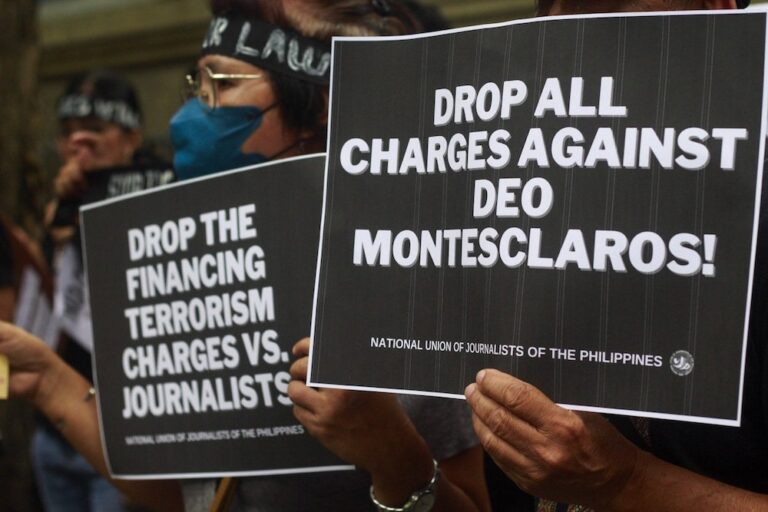(CPJ/IFEX) – CPJ is deeply concerned over persistent evidence that an ongoing advertising boycott of the “Philippine Daily Inquirer”, one of the Philippines’ top newspapers, may have been instigated at the urging of President Estrada’s office. Several large private and government-run corporations have recently withdrawn their advertising from the “Inquirer”, despite the fact that the […]
(CPJ/IFEX) – CPJ is deeply concerned over persistent evidence that an
ongoing advertising boycott of the “Philippine Daily Inquirer”, one of the
Philippines’ top newspapers, may have been instigated at the urging of
President Estrada’s office.
Several large private and government-run corporations have recently
withdrawn their advertising from the “Inquirer”, despite the fact that the
newspaper is the largest-circulation daily in the country. The president,
meanwhile, has been openly critical of the “Inquirer”, contending that the
paper publishes only negative stories about him – a charge the “Inquirer”
denies.
Movie producers – whose ads constitute an important segment of the
newspaper’s revenue base – have stated in the local and international press
that they withdrew their advertisements from the “Inquirer” as a “gesture of
sympathy” for the president. The pullout came after a group of producers met
with him on 8 July 1999 and requested tax breaks for their industry. The
president’s spokesman has since announced that the tax breaks have been
approved.
The publisher of the “Inquirer”, Isagani Yambot, wrote in a letter to CPJ:
“Our sources said the President asked [the movie producers] to pull out
their ads from the ‘Inquirer’ as a quid pro quo for the tax incentives for
the movie industry that they were asking from him. Two other newspapers –
“Business World” and the “Manila Times” – ran basically the same story.” The
“Inquirer” also reported that three large government-run corporations – the
Land Bank of the Philippines, the Philippine National Bank and the Social
Security System – have withdrawn their advertising from the paper, along
with the Philippines’ largest telecommunications company, Philippine Long
Distance Telephone, and its sister company, Smart Communications.
The actions come after months of deteriorating relations between Malacañang
Palace and newspapers critical of President Estrada’s administration. In
early March, the president filed a libel suit against the “Manila Times”
newspaper seeking $2.6 million in damages
over a story that allegedly linked him to a government contract scandal. The
suit was settled after the publisher issued a public apology (see IFEX
alerts of 13 April and 24 March 1999). On 21 June, however, the “Manila
Times” was shut down, having been bought by investors who reportedly have
close political connections to President Estrada’s administration.
In April, staff members of the “Inquirer” told reporters privately that
officials within the presidential palace had pressured them to downplay a
story about a government consultant who was linked to a textbook purchasing
scandal. In June, President Estrada announced that he would no longer
entertain questions from print reporters. Instead, he vowed to address the
nation exclusively through television and radio.
CPJ joins the Southeast Asian Press Alliance (SEAPA) and the editorial
staffs of the “Inquirer” and the “Manila Times” in warning that economic
retaliation against the media by powerful officials poses a grave threat to
press freedom. Such abuse of power undermines the guarantees set forth in
Article 19 of the Universal Declaration of Human Rights, which establishes
the right to free expression “without interference.”
The strength of the free press in the Philippines has been the envy of
journalists throughout the region, and the preservation of this tradition is
crucial to maintaining the health of any democracy.
Recommended Action
Send appeals to the president:
boycott of the “Inquirer” and disavow any support for such a strategy of
harassment, because even the appearance of government interference with the
media can have a profoundly chilling effect
ally
of the palace uses undue influence to affect the ownership or editorial
integrity of any media outlets in the Philippines
Appeals To
His Excellency Joseph Ejercito Estrada
President of the Republic of the Philippines
Office of the President
Malacañang Palace
Manila, Philippines
Fax: +63 2 735 6152
E-mail: erap@erap.com
Please copy appeals to the source if possible.


